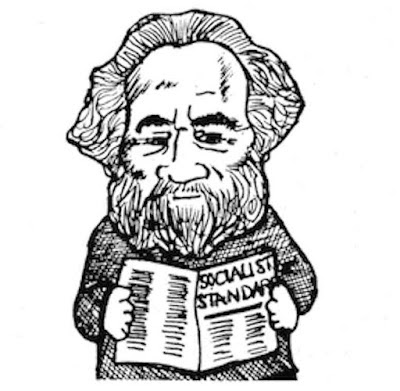The working class should not side with any of our class enemies. It should stand for its own interests—freedom from wage slavery and exploitation; socialism: a society of production for use and free access, where all will contribute according to their abilities.
The Socialist Party is against capitalism. This means socialists are for a global union, and not nation states, federal unions or global capitalism. When it comes to the nationalistic zeal there is nothing at all with which we can identify, for both are abstractions that have imbued the workers of the region with a false consciousness that prevents them from identifying their real interests. For the real conflict is yet to be waged—that between ourselves, the exploited, and the master class—though with ideas, not cannon and bombs.
In a socialist society, critical decisions affecting whole communities will not, as is so often the case today, be made undemocratically by a Board of Directors meeting privately or by some autocratic state committee as in China or Cuba. Decisions will have to be made democratically by anyone in the community who wishes to participate in the process and vote. Everyone will need to have access to any information they require.
There will be no separate economic interests, as now, but there will of course be multifarious social interests. Experts and campaigners will disagree. If that sort of debate and progression through the clash of ideas ever ceases, society will stagnate. Some people will favour more rail transport infrastructure and others will be opposed, some will favour one form of energy development while others will disagree. These disputes will need to be democratically settled according to set procedures not dealt with all over society in a sort of random, capricious, chaotic way according to whatever mode of decision-making happened to prevail in a particular area at a particular time.
In order for this to be done reliably, and in a way which allows all citizens the comfort of knowing in advance of any decision how it will be made and how, if need be, it can be challenged, there will need to be rule. Anyone who thinks that all rules, by definition, are bad would need to ask whether he or she would say, if caught in a hotel fire, “bugger the Fire Rules about the procedures to be followed in the case of a fire, I’m not being dictated to.” Rules are not always made by one person or group to oppress another.
A socialist society will have to operate according to rules. There will be lots of them. Who can practise medicine, who can pilot planes, who can drive cars, what procedures will be required to be followed in order to stop an allegedly incompetent person from practising, the procedures for deciding on whether society wishes to build more roads, and the priorities of using resources will all need to be governed by a democratic process which will require rules. A democratic process is not something you can make up as you go along.
The Socialist Party has never overly boasted of its proletarian origin and membership; it is so “proud” of its class that it is out for its abolition. We shall continue to pursue our immediate task—political education, never swerving from our adherence to the principle of delegation of executive work and abhorrence of leadership; in short, to the principles of socialism and all that socialism implies.
Today’s society rests on the basis of capitalist private ownership. A small section of society owns the lands, factories and machines for producing wealth, and are able by this ownership to live without working. The workers who possess nothing but their energy are forced to sell themselves piecemeal to the capitalists for wages. Each day they produce goods of all descriptions which belong to their masters, who desire neither to consume these goods nor keep them, only to sell them. Failure to sell generally means that the workers are thrown on the streets to search for alternative employment. In a socialist society, all able-bodied people would be expected to do their share of the necessary work of society, but this has no relation to the present wage slavery.
Because we state these facts, does this mean that our propaganda is doleful or pessimistic? No, it means that we realise that the economic laws running through society, not a few abstract “revolutionary” measures will determine what kind of a world will emerge following this conflict.
Failing the advent of socialism it will be a world where the capitalist class will be still in control, where the struggle for markets, jobs and existence will be even fiercer than in previous ages. It cannot be altered by a few ameliorative laws passed in Parliament which can modify or remedy a few glaring anomalies, but so far as the general trend of events is concerned the politicians are helpless and hapless. Their political somersaults show only too clearly how incapable our masters are of discerning the future, even from day to day.
We cannot do that either, but we can and have shown that so long as wealth is produced for profit, certain evils must exist. We have shown that reforms cannot alter the basis of society, but merely remedy some defects of capitalism, they have failed to deal with any major evil such as unemployment, poverty, slums, crises and wars. These were with us 150 years ago, and are still with us today. All the reforms and planning that are suggested will not alter that.



.png)
.jpg)



